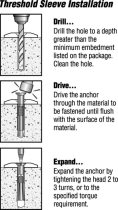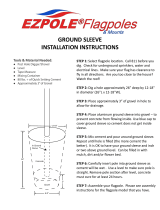Toro CM-1258Y-SD Concrete Mixer User manual
- Type
- User manual

FormNo.3429-716RevA
CM-1258Y-SDConcreteMixer
ModelNo.68011—SerialNo.404320000andUp
Registeratwww.Toro.com.
OriginalInstructions(EN)
*3429-716*A

ItisaviolationofCaliforniaPublicResourceCode
Section4442or4443touseoroperatetheengineon
anyforest-covered,brush-covered,orgrass-covered
landunlesstheengineisequippedwithaspark
arrester,asdenedinSection4442,maintainedin
effectiveworkingorderortheengineisconstructed,
equipped,andmaintainedforthepreventionofre.
Theenclosedengineowner'smanualissupplied
forinformationregardingtheUSEnvironmental
ProtectionAgency(EPA)andtheCaliforniaEmission
ControlRegulationofemissionsystems,maintenance,
andwarranty.Replacementsmaybeorderedthrough
theenginemanufacturer.
TireInformation—TheDOTtireinformationislocated
onthesideofeachtire.Thisinformationgivesload
andspeedratings.Replacementtiresshouldhavethe
sameorbetterratings;refertoSpecications(page
14)toensurethatthetiresonyourmachinemeetor
exceedtheweightrequirementsofyourmachine.
WARNING
CALIFORNIA
Proposition65Warning
Dieselengineexhaustandsomeofits
constituentsareknowntotheStateof
Californiatocausecancer,birthdefects,
andotherreproductiveharm.
Useofthisproductmaycauseexposure
tochemicalsknowntotheStateof
Californiatocausecancer,birthdefects,
orotherreproductiveharm.
Introduction
Thismachineisdesignedtomixconcrete,plaster,
reproongmaterial,grout,andothersmall-grained
concreteproducts.Youcantowthemachinebehinda
vehicleequippedwithahitchappropriateforthetype
oftowpoleyourmachinehas(ball,pintle,orpinhitch).
Readthisinformationcarefullytolearnhowtooperate
andmaintainyourproductproperlyandtoavoid
injuryandproductdamage.Youareresponsiblefor
operatingtheproductproperlyandsafely.
YoumaycontactT orodirectlyatwww.T oro.com
forproductsafetyandoperationtrainingmaterials,
accessoryinformation,helpndingadealer,orto
registeryourproduct.
Wheneveryouneedservice,genuineT oroparts,or
additionalinformation,contactanAuthorizedService
DealerorToroCustomerServiceandhavethemodel
andserialnumbersofyourproductready.Figure1
identiesthelocationofthemodelandserialnumbers
ontheproduct.Writethenumbersinthespace
provided.
Important:Withyourmobiledevice,youcan
scantheQRcodeontheserialnumberdecal(if
equipped)toaccesswarranty,parts,andother
productinformation.
g242288
Figure1
1.Modelandserialnumberlocation
ModelNo.
SerialNo.
Thismanualidentiespotentialhazardsandhas
safetymessagesidentiedbythesafety-alertsymbol
(Figure2),whichsignalsahazardthatmaycause
seriousinjuryordeathifyoudonotfollowthe
recommendedprecautions.
©2018—TheToro®Company
8111LyndaleAvenueSouth
Bloomington,MN55420
2
Contactusatwww.Toro.com.
PrintedintheUSA
AllRightsReserved

g000502
Figure2
Safety-alertsymbol
Thismanualuses2wordstohighlightinformation.
Importantcallsattentiontospecialmechanical
informationandNoteemphasizesgeneralinformation
worthyofspecialattention.
Contents
Safety.......................................................................4
SafeOperatingPractices....................................4
SafetyandInstructionalDecals..........................7
Setup........................................................................9
1InstallingtheT owPole.....................................9
2InstallingtheSafetyChain..............................10
ProductOverview....................................................11
Controls............................................................11
Specications..................................................14
Operation................................................................14
PreparingtoTowtheMachine...........................14
TowingtheMachine..........................................18
PreparingtoUsetheMachine...........................19
OpeningandClosingtheCowl..........................19
AddingFuel......................................................20
CheckingtheEngine-OilLevel..........................22
StartingtheEngine...........................................23
ShuttingOfftheEngine.....................................24
UsingtheMachine............................................24
MixingtheMaterial...........................................25
UsingtheDrum.................................................25
Maintenance...........................................................27
RecommendedMaintenanceSchedule(s)...........27
Pre-MaintenanceProcedures..............................27
PreparingtheMachineforMaintenance............27
RemovingandInstallingtheDivider
Plate..............................................................27
Lubrication..........................................................28
LubricatingtheMachine....................................28
LubricatingtheDriveChain...............................29
EngineMaintenance...........................................29
ServicingtheAirCleaner..................................29
ChangingtheEngineOil...................................30
ServicingtheEngine-OilFilter...........................31
RemovingandInstallingtheEngine..................32
FuelSystemMaintenance...................................32
ServicingtheFuelSystem................................32
DriveSystemMaintenance..................................34
ServicingtheReductionCase...........................34
ServicingtheDriveChain.................................34
Cleaning..............................................................35
CleaningtheMachine.......................................35
Storage...................................................................36
StoringtheMachine..........................................36
Troubleshooting......................................................37
3

Safety
Improperuseormaintenancebytheoperatoror
ownercanresultininjury.Toreducethepotential
forinjury,complywiththesesafetyinstructions
andalwayspayattentiontothesafety-alertsymbol
(Figure2),whichmeans:Caution,Warning,or
Danger—personalsafetyinstruction.Failureto
complywiththeinstructionmayresultinpersonal
injuryordeath.
SafeOperatingPractices
Thisproductiscapableofamputatinghands.Always
followallsafetyinstructionstoavoidseriousinjuryor
death.
WARNING
Machiningorhandlingstone,masonry,
concrete,metal,andothermaterialscan
generatedust,mists,andfumescontaining
chemicals,suchassilica,knowntocause
seriousorfatalinjuryorillness,suchas
respiratorydisease,silicosis,cancer,birth
defects,orotherreproductiveharm.
•Controldust,mist,andfumesatthe
sourcewherepossible.Usewaterfordust
suppressionwhenfeasible.
•Usegoodworkpracticesandfollowthe
recommendationsofthemanufactureror
suppliers,OSHA,andotheroccupational
andtradeassociations.
•Alwaysfollowrespiratoryprecautions.
•Whenyoucannoteliminatethehazards
frominhalation,youandanybystanders
shouldweararespiratorapprovedby
OSHAforthematerialbeinghandled.
WARNING
Engineexhaustcontainscarbonmonoxide,
anodorless,deadlypoisonthatcankillyou.
Donotruntheengineindoorsorinan
enclosedarea.
Training
•ReadtheOperator'sManualandothertraining
material.Iftheoperator(s)ormechanic(s)cannot
readorunderstandtheinformation,itisthe
owner'sresponsibilitytoexplainthismaterialto
them.
•Becomefamiliarwiththesafeoperationofthe
equipment,operatorcontrols,andsafetysigns.
•Alloperatorsandmechanicsshouldbetrained.
Theownerisresponsiblefortrainingtheusers.
•Neverletchildrenoruntrainedpeopleoperateor
servicetheequipment.Localregulationsmay
restricttheageoftheoperator.
•Theowner/usercanpreventandisresponsible
foraccidentsorinjuriestopeopleordamageto
property.
Towing
Checkwithyourlocalcountyorstatetowingsafety
regulationsbeforetowingthemachine.
•Toreducethepossibilityofanaccidentwhile
transportingthemachineonpublicroads,ensure
thatthetowingvehicleismechanicallysoundand
ingoodoperatingcondition.
•Shutofftheenginebeforetransportingthe
machine.
•Whentowingwithaballhitch,ensurethattheball
hitchyouareusingisthepropersizeforthehitch
coupleronthemachine.
•Whentowingwithapintlehitch,ensurethatthe
eyeofthetowpoleisthecorrectdimensionfor
thepintlehook.
•Donottowwithoutthesafetypininsertedintothe
topofthereceiver.
•Inspectthehitchandcouplingforwear.Nevertow
themachinewithdamagedordefectivehitches,
couplings,chains,orothercomponents.
•Checkthetireairpressureonthetowingvehicle
andthemachine.
•Checkthetiretreadandsidewallfordamageand
wear.
•Properlyattachthesafetychainstothetowing
vehicle.
•Ensurethatthedirectionalandbrakelightsare
workingproperly(ifthemachineisequippedwith
thelightkit).
•Ensurethatthedirectional,backup,andbrake
lightsofthetowvehicleareworkingproperly(if
equipped).
•Beforetowing,ensurethatyourmachineis
correctlyandsecurelyattachedtothetowing
vehicle.
•Ensurethatthesafetychainsareproperlysecured
tothevehicle,andleaveenoughslackforturning.
•Donotcarryanymaterialinthemachinewhen
towing.
•Avoidsuddenstopsandstarts.Thiscancause
skidding,orjackkning.Smooth,gradualstarts
andstopswillimprovetowing.
•Avoidsharpturnstopreventrolling.T owonlywith
avehiclethathasahitchdesignedfortowing.Do
4

notattachtowedequipmentexceptatthehitch
point.
•Donottowthemachinefasterthan88km/h(55
mph).
•Usecautionwhenbackingup;useaspotter
outsidethevehicletoguideyou.
•Donotallowanyonetositorrideonthemachine.
•Disconnectthemachinefromthetowvehicle
beforeusingit.
•Securethemachinefrommovementbeforeyou
towit.
•Placechockblocksunderneaththetirestoprevent
themfromrollingwhilethemachineisparked.
Preparation
Becomefamiliarwiththesafeoperationofthe
equipment,operatorcontrols,andsafetysigns.
•Useonlyaccessoriesandattachmentsapproved
bythemanufacturer.
•Wearpersonalprotectiveequipment(PPE)and
appropriateclothing,includingthefollowing:
–Hardhat
–Respiratorordustmask
–Faceshield
–Safetyglasses
–Hearingprotection
–Substantial,slip-resistantfootwear
–Longpants
–Shirtwithlongsleevesthataretightatthe
wrists
–Tight-ttinggloveswithoutdrawstringsorloose
cuffs
•Securelooseclothing,tiebacklonghair,anddo
notwearloosejewelry.
•Useextracarewhenhandlingfuels.Theyare
ammableandthevaporsareexplosive.Usethe
followingpracticeswhenhandlingfuel:
–Useonlyanapprovedfuelcontainer.
–Neverremovethefuelcaporaddfuelwiththe
enginerunning.
–Allowtheenginetocoolbeforerefueling.
–Donotsmoke.
–Neverrefuelordrainthemachineindoors.
–Installthefuelcapandtightenitsecurely.
–Keepthecontainernozzleincontactwiththe
tankduringlling.
–Neverllacontainerwhileitisinsideavehicle,
trunk,pickupbed,oranysurfaceotherthan
theground.
–Neverstorethemachineorfuelcontainer
insidewherethereisanopename,suchas
nearawaterheaterorfurnace.
–Ifyouspillfuel,wipeitofftheengineand
equipment.
•Ensurethatthemachineisonalevelsurface
beforeoperatingthemachine.
•Chockthetiresofthemachinetoprevent
unintendedmovement.
•Beforeeveryuse,dothefollowing:
–Inspectthecoupler,ball,andhitch.
–Ensurethatalllightsarefunctioningproperly
(ifequipped).
–Ensurethatthetiresareproperlyinatedas
recommended.
–Ensurethatthewheellugnutsaretightand
torquedproperly.
–Ensurethatthemachineisproperlysecured.
Operation
•Useyourfullattentionwhileoperatingthe
machine.Donotengageinanyactivitythat
causesdistractions;otherwise,injuryorproperty
damagemayoccur.
•Neverruntheengineinanenclosedorpoorly
ventilatedarea.
•Operatethemachineonlyingoodlighting
conditions.
•Beforestartingthemachine,ensurethatthere
arenopersonsorobstaclesnearorunderthe
machine.
•Shutofftheenginebeforeleavingthemachinefor
anyreason.
Neverleavearunningmachineunattended.
Alwaysshutofftheengineandverifythatall
movingpartshavestopped.
•Chockthetiresofthemachineorkeepitattached
tothetowingvehiclewhenitisnotinuse,to
preventitfromrolling.
•Avoidprolongedbreathingofexhaustfumes.
Engineexhaustfumescancausesicknessor
death.
•Keepyourhandsawayfromanymovingparts.
Keepyourfeetawayfromthetiresandthefront
post.
•Donotoperatethemachinewhileill,tired,or
undertheinuenceofalcoholordrugs.
•Keepbystanders,especiallysmallchildren,outof
theoperatingarea.Stopthemachineifanyone
entersthearea.
•Neverplaceyourhandsoranysolidobjectintothe
drumwhenthemachineisinoperation.
5

•Donottouchpartswhichmaybehotfrom
operation.Allowthemtocoolbeforeattemptingto
maintain,adjust,orservicethemachine.
•Nevermovethemachinewhiletheengineis
running.
•Keepthecowlclosedandlatchedduringoperation.
•Ensurethatalltheguardsandshieldsaresecurely
inplacebeforeoperatingthemachine.
•Ifthemixingpaddlesstrikeaforeignobjectorifthe
machineshouldstartmakinganunusualnoiseor
vibration,shutofftheengineandemptythedrum.
Waitforallmovingpartstocometoacomplete
stopandcool.Vibrationisgenerallyawarningof
trouble.Inspectforcloggingordamage.Clean
andrepairand/orreplacedamagedparts.
•Donotchangetheenginegovernorsettingor
overspeedtheengine.
•Lightningcancausesevereinjuryordeath.Ifyou
seelightningorhearthunderinthearea,donot
operatethemachine;seekshelter.
MaintenanceandStorage
•Beforeperformingmaintenance,dothefollowing:
–Parkthemachineonalevelsurface.
–Shutofftheengine.Waitforallmovementto
stopandremovethesparkplugwirebefore
adjusting,cleaning,orrepairing.
–Allowtheenginetocoolbeforeperforming
maintenanceorstoring.
–Disengageallpowerandoperationcontrols
beforemakinganyrepairs.
•Neverlubricate,service,repair,oradjustthe
machinewhileitisrunning.
•Keepequipmentmaterialsclearfromthemufer
andenginetohelppreventres.Wipeupany
spilledoilorfuel.
•Neverallowuntrainedpersonneltoservicethe
machine.
•Keepyourhands,feet,andclothingawayfrom
movingparts.Ifpossible,donotmakeadjustments
withtheenginerunning.
•Keepallpartsingoodworkingconditionandall
hardwaretightened.Replaceallwornordamaged
decals.
•Removeanybuildupofgrease,oil,ordebrisfrom
themachine.
•Stopthemachine,shutofftheengine,andinspect
themachineifaforeignobjectentersthedrumor
causesanotherobstruction.Makeanynecessary
repairsbeforestartingthemachine.
•Donottamperwithsafetydevices.
•Securethemachinefrommovementandchock
thetireswhenstoringthemachine.
•Keepallnuts,bolts,screws,andhoseclamps
securelytightened.Keepthemachineingood
condition.
•UseonlygenuineT ororeplacementpartsto
ensurethattheoriginalstandardsaremaintained.
6

SafetyandInstructionalDecals
Safetydecalsandinstructionsareeasilyvisibletotheoperatorandarelocatednearanyarea
ofpotentialdanger.Replaceanydecalthatisdamagedormissing.
decal133-8062
133-8062
decal125-8216
125–8216
1.ReadtheOperator’s
Manualforinformationon
howtotowthemachine.
2.Warning—limittowing
speedtolessthan88km/h
(55mph)
decal125-8175
125–8175
1.ReadtheOperator’sManualforinformationongreasing
themachine.
decal132-7176
132–7176
1.Pulluptostarttheengine.
2.Pushdowntoshutoffthe
engine.
7

decal125-4939
125–4939
1.Warning—readthe
Operator’sManual.
4.Toxicgasinhalation
hazard—Donotrunthe
engineinanenclosed
space.
2.Handandarm
entanglementatthechain
drive;crushinghazard
ofhand;entanglement
hazardofhandatthe
shaft—keephandsaway
frommovingparts;keep
allguardsandshieldsin
place.
5.Explosionhazard—stop
theengineandkeep
awayfromameswhen
refueling.
3.Entanglementhazardat
paddles—stoptheengine
andwaitforallmoving
partstostopbefore
performingmaintenance.
8

Setup
LooseParts
Usethechartbelowtoverifythatallpartshavebeenshipped.
ProcedureDescription
Qty.
Use
1
Towpolekit(soldseparately)
1Installthetowpole.
Safetychain
1
2
Connectinglink
2
Installthesafetychain.
1
InstallingtheTowPole
Partsneededforthisprocedure:
1
Towpolekit(soldseparately)
InstallingtheTowPoletothe
Machine
Note:Thetowpoleispurchasedseparatelyand
includesthenutandboltneededforinstallation.
Themachinehasthefollowingtowpoleoptions:
HitchTypeLength
50mm(2inch)ball—stamped127cm(50inches)
50mm(2inch)ball—forged127cm(50inches)
Pintle
127cm(50inches)
1.Removetheboltandnutfromthetowpole
(Figure3).
g019804
Figure3
1.Towpole4.Bolthole
2.Frontpost
5.Frametting
3.Bolt6.Nut
2.Slidethetowpoleforwardandaligntheholein
thepolewiththeholeintheframetting(Figure
3).
3.Inserttheboltthroughtheholesinthettingand
thepole(Figure3).
4.Threadthenutontotheboltandtightenthem
untiltheyaretightagainsttheframetting
(Figure3).
Note:Iftheself-lockingnyloninsertinthe
locknutwearswithuse,replacethenutwitha
newGrade5orGrade8locknut.
9

2
InstallingtheSafetyChain
Partsneededforthisprocedure:
1
Safetychain
2
Connectinglink
InstallingtheSafetyChain
1.Formahookontheendofabendablepiece
ofrodorstiffwire(notincluded),andinsertit
throughbothkeyholesinthefrontpostofthe
machine(Figure4A).
g019883
Figure4
1.Keyhole
3.Safetychain
2.Rodorwire(notincluded)4.Connectinglink
2.Attachthesafetychaintothelengthofrodor
wire(Figure4A).
3.Pulltherod,orwire,andthesafetychain
throughbothkeyholes(Figure4B).
Note:Ensurethatapproximatelyequallengths
ofsafetychainextendfromeithersideofthe
frontpost.
InstallingtheConnectingLinks
1.Aligntheconnectinglinktothelastlinkinone
endofthesafetychain(Figure4D).
2.Inserttheconnectinglinkthroughthechainlink
untiltheconnectinglinksnapsclosed.
3.Repeatsteps1and2toinstalltheother
connectinglinkintheotherendofthesafety
chain.
10

ProductOverview
g020003
Figure5
1.Enginecowl5.Towpole
2.Drum6.Drum-tiltbrake
3.Handwheel7.Rubberlatch
4.Safety-chainkeyholes
Controls
Becomefamiliarwithallofthecontrolsbeforeyou
starttheengineandoperatethemachine.
Handwheel
Thehandwheelcontrolsthetiltofthedrum.
Drum-TiltBrake
Thedrum-tiltbrakelocksthedrumintoposition.
11

EngineControls
g020004
Figure6
1.Fueldrainplug8.Fueltank
2.Aircleaner9.Fuelcap
3.Recoil-starthandle10.Decompressionlever
4.Oilcap/dipstick11.Oillter
5.Engine-speed-control
knob
12.Oil-drainplug
6.Fuel-injectionpump
13.Oilcap/dipstick
7.Fuel-shutofflever
EngineSpeedControlHandle
Theengine-speed-controlhandle(Figure7)allows
theoperatortostartandshutofftheengine.Itis
locatedontheenginecowl,andisconnectedtothe
engine-speed-controlknob,whichislocatedonthe
engine(Figure8).T ocontroltheengine-speed-control
handle:
1.Rotatetheengine-speed-controlhandle
counterclockwisetounlockit.
2.Pullitallthewayoutandlockitbyrotatingit
clockwise.
3.Rotateitcounterclockwiseandpushitintostop
theengine.
Note:Thespeed-controlknobontheenginemustbe
loose(rotatedcounterclockwise)forthecowl-mounted
speed-controlhandletowork.
12

g020357
Figure7
1.Engine-speed-controlhandle
g020001
Figure8
1.Engine-speed-controlknob
Fuel-ShutoffLever
Thefuel-shutoffleverislocatedunderneaththefuel
tank.Movethefuel-shutofflevertotheONposition
beforeattemptingtostarttheengine.Onceyouhave
nishedusingthemachineandyouhaveshutoffthe
engine,movethefuel-shutofflevertotheOFFposition.
g020002
Figure9
1.Fuel-shutoffleverinOnposition
Recoil-StartHandle
Tostarttheengine,pulltherecoil-starthandle(Figure
6)quicklytoturntheengineover.Theenginecontrols
describedabovemustallbesetcorrectlyforthe
enginetostart.
13

Specications
Note:Specicationsanddesignaresubjectto
changewithoutnotice.
BatchCapacity
0.34m
3
(12ft
3
)
TotalVolume0.56m
3
(19.8ft
3
)
Length241cm
(95inches)
Width142cm
(56inches)
Height178cm
(70inches)
Weight407kg
(897lb)
Operation
Important:Beforeoperatingthemachine,check
thefuelandoillevelsandremovedebrisfromthe
machine.Ensurethattheareaisclearofpeople.
PreparingtoTowthe
Machine
Important:Ensurethatyourtowvehiclehas
towingcapacityfortheweightofthemachine.
Important:UseaClass2orlargerreceiver.
Note:Ensurethatyourtowvehiclehasthe
appropriatehitchtotowthemachine;optionsinclude
a50mm(2inch)ballhitchorapintlehitch.
Note:Ifthemachineisequippedwithatrailer-light
kit,ensurethattheelectricalconnectorofthetow
vehicleiscompatiblewiththeelectricalconnectorof
themachine.Ifyourtowvehiclehasadifferenttype
ofplug,obtainanadapterfromanautomotiveparts
store.
1.Ensurethattheengineisstopped,the
fuel-shutoffleverisoff,andthedrumisempty.
2.Usingthehandwheel,positionthedrumsothatit
ispointingdowntowardtheground(Figure10).
g019995
Figure10
1.Drumpointingdown3.Towpoleboltedinplace
2.Drum-tiltbrakeengaged
3.Lockthedrumintopositionbypushingdownon
thedrum-tiltbrakehandle(Figure11).
14

g019733
Figure11
Drum-TiltBrake
1.Unlockedposition2.Lockedposition
4.Ensurethattheenginecowlisclosedand
latched;refertoClosingtheCowl(page19).
5.Inspectthetiresandwheels;refertoChecking
theTiresandWheels(page15).
CheckingtheTiresandWheels
ServiceInterval:Beforeeachuseordaily—Inspect
thetiresandwheels.
Aftereachuse—T orquethelugnutsto108to
122N-m(80to90ft-lb)aftertowing.
WARNING
Failuretomaintaincorrecttirepressure
mayresultintirefailureandlossofcontrol,
resultinginpropertydamageandserious
injuryordeath.
•Checkthetirepressurefrequentlyto
ensureproperination.Ifthetiresarenot
inatedtothecorrectpressure,theywill
wearprematurely.
•Inspectthetireconditionbeforetowing
andafteranyoperatingaccident.
TheDOTtireinformationislocatedonthesideof
eachtire.Thisinformationgivesloadandspeed
ratings.Replacementtiresshouldhavethesame
orbetterratings.Formoreinformationgoto
http://www.nhtsa.gov/Vehicle+Safety/Tires.
Note:RefertoSpecications(page14)andensure
thatallreplacementtiresmeetorexceedtheratings
forthismachine.
1.Visuallyinspectthetiresfordamageandwear
(Figure12andFigure13).
g020836
Figure12
1.Exampleoftirewearcausedbyunderination
g010293
Figure13
1.Exampleoftirewearcausedbyoverination
2.Ensurethatthetiresareinatedtothecorrect
air-pressure.Thefollowingratingindicatesthe
appropriateairpressureforthetiresasinstalled
atthefactory.
Important:Alwayschecktheinformationon
theactualtiresforthecorrectairpressure
requirement.
Important:Themostcommoncauseoftire
troubleisunderination.Maintainfullair
pressure.
AirPressure:Max241kPa(35psi)
3.Ensurethatthewheellugnutsaretorquedto
108to122N-m(80to90ft-lb).
Note:Checkthetorqueofthewheellugnuts
initiallyandaftertowing.
Note:Torquethelugnutsinthesequence
showninFigure14.
15

g021107
Figure14
HitchingaMachinewithaStamped
BallCoupler
1.Applychassisgreasetothesocketofthecoupler
andtheareaoftheclampthatcontactstheball.
2.Oilthepivotpointsandslidingsurfacesofthe
couplerwithSAE30motoroil.
3.Openthecouplerlatch(Figure15).
g020359
Figure15
1.Bail
2.Safetypin
4.Positionthecouplerontopofthehitchball
(Figure15A).
5.Closethecouplerlatch(Figure15B).
6.Openthebailonthesafetypinandinsertthepin
throughtheholeinthelatch(Figure15B).
7.Rotatethefreeendofthebailovertheendof
thesafetypinthatisprotrudingthroughthelatch
(Figure15C).
8.Ifthemachineisequippedwithatrailer-lightkit,
connectthewireplugofthetowvehicletothe
wireplugofthemachine.
16

HitchingaMachinewithaForged
BallCoupler
1.Applyremovablethread-lockingcompoundto
thethreadsofthecouplerbolttopreventthe
couplerhandlefromcomingloose(Figure16).
Important:Applythread-lockingcompound
asneededinthefuture.
g019807
Figure16
1.Couplerhandle
4.Bolt
2.Coupler
5.Hitchball
3.Clamp
2.Applychassisgreasetothesocketofthecoupler
andtheareaoftheclampthatcontactstheball.
3.Pushthecouplerboltupthroughthecoupler
clampandthecouplertop,andconnectthe
couplerhandletothebolt(Figure16A).
4.Positionthecouplersothatthesocketisontop
ofthehitchballandtheclampisundertheball
(Figure16C).
5.Turnthecouplerhandleclockwisetothreadit
ontotheboltuntilitissecure(Figure16D).
Note:Useawrenchtokeeptheboltfrom
spinning.
6.Ifthemachineisequippedwithatrailer-lightkit,
connectthewireplugofthetowvehicletothe
wireplugofthemachine.
HitchingaMachinewithaPintle
HitchTowPole
1.Removethepinfromthepintlehitchandopen
it(Figure17).
g019809
Figure17
2.Positiontheringonthetowpoleontothehook
ofthepintlehitch(Figure17).
3.Closethetopofthepintlehitchandsecureit
withthepin(Figure17).
4.Ifthemachineisequippedwithatrailer-lightkit,
connectthewireplugofthetowvehicletothe
wireplugofthemachine.
17

ConnectingtheSafetyChainsto
theTowVehicle
Connectthesafetychaintothemachineandthetow
vehicleasfollows:
1.Pullthesafetychainthroughtheslotsinthe
keyholeslocatedinthefrontpostofthemachine,
sothatthereisjustenoughslackoneachside
forturningaroundcornerswhentowingthe
machineFigure18).
Note:Stowtheexcesschaininsidethebottom
ofthefrontpostbypushingitintothekeyholes
andlatchingtheappropriatelinksintothe
keyholeslots.
2.Crossbothlengthsofchainunderthetowpole.
Note:Crossingthechainsdecreasesthe
chancesofthefrontofthemachinedropping
tothegroundifthehitchdoesnotholdthe
connection.
g021177
Figure18
1.Connectinglinks3.Chaincrossedundertow
pole
2.Keyholesinfrontpost
3.Connecteachlengthofchaintothesafety
chainmountingpointonthetowvehiclewiththe
connectinglinks(Figure19).
g021178
Figure19
1.Connectinglink3.Chainlink
2.Safetychainmounting
pointontowvehicle
TowingtheMachine
WARNING
Towingthemachineathighspeedincreases
theriskofahitchmalfunctionandtirefailure.
Higherspeedsalsoincreasethemomentum
ofthemachineandbrakingdistance.Ifthe
machinebecomesdetachedfromthetow
vehicleathighspeed,itcouldcausedamage
toproperty,orinjuryordeathtobystanders.
Donotexceed88km/h(55mph)whentowing
themachine.Forpoorroadconditionsor
inclementweather,reducespeedaccordingly.
WARNING
Towingthemachinewithmaterialinthedrum
increasestheriskofahitchmalfunctionand
tirefailure.Inaddition,materialcouldbounce
outofthedrumandhitothervehiclesand/or
people.Materialinthedrumincreasesthe
weight,whichaffectsmomentumandbraking
distance.
Donottowthemachinewithmaterialinthe
drum.
•ReviewandunderstandSafeOperatingPractices
(page4).
•Testthebrakesofthetowvehiclebeforetowing.
•Avoidsuddenstartsandstopswhiletowingthe
machine.
18

PreparingtoUsethe
Machine
•Reviewallofthesafetydecalsonthemachine.
•Useahard-hat,hearingprotection,ashirtwith
longsleevesthataretightatthewrists,tight-tting
gloveswithoutdrawstringsorloosecuffs,eye
protection,andadustmaskorrespirator.A
meshvisoralonedoesnotprovidesufcienteye
protection;supplementwithprotectiveglasses.
•Ensurethatyouarefamiliarwiththesafety
regulationsandshutdownproceduresdescribed
intheOperator’sManualandEngineOwner’s
Manual.
•Ensurethatallguardsareinplaceandingood
condition.
•Ensurethatthepaddlesareinplaceandingood
condition.
•Checkthefuelandoillevelsoftheengine.
•Whenpreparingtomixmaterial:
1.Movethemachinetoaleveljob-sitesurface.
2.Removethemachinefromthetowvehicle.
3.Chockthefrontandbackofthetiresto
preventthemachinefrommoving.
4.Ensurethatthedrumisinthemixposition
(upright).
5.Ensurethatthedrum-tiltbrakeisengaged
andthatthedrumdoesnotrotatetowardthe
dumpposition.
OpeningandClosingthe
Cowl
OpeningtheCowl
1.Atthesideofthemachinewherethefrontcowl
andrearcowlmeet,grasptheringofthelatch
andpullitofffromthelatchanchorontherear
cowl(Figure20).
g021318
Figure20
Openingandclosingthecowl
1.Latch3.Receiver
2.Latchanchor
4.V-tting
2.Repeat1ontheoppositesideofthemachine.
3.Atthebackofthemachinewheretherearcowl
meetstheframeofthemachine,graspthering
ofthelatchandpullitofffromthelatchanchor
onthecowl(Figure20).
4.Rotatetherearcowlupandforwarduntilitis
fullypositionedontopofthefrontcowl(Figure
20).
ClosingtheCowl
1.Rotatetherearcowlrearwardanddownuntil
thereceiveratthebottomcenterofthecowlis
alignedwiththeV-ttingandushontheframe
ofthemachine(Figure20).
2.Atthebackofthemachine,grasptheringofthe
latchandpullitontothelatchanchoronthe
rearcowl.
3.Atthesideofthemachine,grasptheringofthe
latchandpullitontothelatchanchorontherear
cowl.
4.Repeatstep3ontheoppositesideofthe
machine(Figure20).
19

AddingFuel
•Useonlyultra-lowsulfur(<15ppm)dieselfuel.
•Purchasefuelinquantitiesthatcanbeusedwithin
30daystoensurefuelfreshness.
•Usesummer-gradedieselfuel(Number2-D)at
temperaturesabove-7°C(20°F)andwinter-grade
dieselfuel(Number1-DorNumber1-D/2-Dblend)
below-7°C(20°F).
•Nevermixkerosene,usedengineoil,orresidual
fuelswiththedieselfuel.
•Donotstorefueleitherinthefueltankorfuel
containersoverthewinter.
•Fueladditivesarenotrecommended.Somefuel
additivesmaycausepoorengineperformance.
DANGER
Incertainconditions,dieselfuelisextremely
ammableandhighlyexplosive.Areor
explosionfromdieselcanburnyouand
othersandcandamageproperty.
Useonlydieselfuel.Fillingthefueltankwith
gasolinemayresultinare.
•Fillthefueltankandstorefuelina
well-ventilatedarea.
•Donotrefuelthefueltankwhiletheengine
isrunning.
•Donotllthefueltankcompletelyfull.Add
fueluntilitisatthesamelevelasthered
ring.Thisemptyspaceinthetankallows
fueltoexpand.
•Neversmokewhenhandlingfuel,andstay
awayfromanopenameorwherefuel
maybeignitedbyaspark.
•Storedieselinanapprovedcontainerand
keepitoutofthereachofchildren.Donot
buymorethana30-daysupplyoffuel.
•Donotoperatewithouttheentireexhaust
systeminplaceandinproperworking
condition.
DANGER
Incertainconditionsduringfueling,static
electricitycanbereleased,causingaspark
whichcanignitethefuelvapors.Areor
explosionfromfuelcanburnyouandothers
andcandamageproperty.
•Alwaysplacefuelcontainersontheground
awayfromyourvehiclebeforelling.
•Donotllfuelcontainersinsideavehicle
oronatruckortrailerbedbecauseinterior
carpetsorplastictruckbedlinersmay
insulatethecontainerandslowthelossof
anystaticcharge.
•Whenpractical,removefuel-powered
equipmentfromthetruckortrailerand
fueltheequipmentwiththewheelsonthe
ground.
•Ifthisisnotpossible,thenrefuelsuch
equipmentonatruckortrailerfroma
portablecontainerratherthanfroma
fuel-dispensernozzle.
•Ifyoumustuseafueldispensernozzle,
keepthenozzleincontactwiththerimof
thefueltankorcontaineropeningatall
timesuntilfuelingiscomplete.
WARNING
Fuelisharmfulorfatalifswallowed.
Long-termexposuretovaporscancause
seriousinjuryandillness.
•Avoidprolongedbreathingofvapors.
•Keepyourfaceawayfromthenozzleand
thefueltankorconditioneropening.
•Keepfuelawayfromyoureyesandskin.
DieselFuelSpecications
Important:Donotmixoilwithdiesel.
Dieselfuelshouldcomplywiththefollowing
specication.Thetablelists7worldwide
specicationsfordieselfuels.
DieselFuelSpecications
Location
Number2-D,Number
1-D,ASTMD975-94
Ultra-lowSulfur(<15ppm)
USA
EN590:96EuropeanUnion
ISO8217DMX
International
BS2869-A1orA2
UnitedKingdom
JISK2204GradeNumber2
Japan
20
Page is loading ...
Page is loading ...
Page is loading ...
Page is loading ...
Page is loading ...
Page is loading ...
Page is loading ...
Page is loading ...
Page is loading ...
Page is loading ...
Page is loading ...
Page is loading ...
Page is loading ...
Page is loading ...
Page is loading ...
Page is loading ...
Page is loading ...
Page is loading ...
Page is loading ...
Page is loading ...
-
 1
1
-
 2
2
-
 3
3
-
 4
4
-
 5
5
-
 6
6
-
 7
7
-
 8
8
-
 9
9
-
 10
10
-
 11
11
-
 12
12
-
 13
13
-
 14
14
-
 15
15
-
 16
16
-
 17
17
-
 18
18
-
 19
19
-
 20
20
-
 21
21
-
 22
22
-
 23
23
-
 24
24
-
 25
25
-
 26
26
-
 27
27
-
 28
28
-
 29
29
-
 30
30
-
 31
31
-
 32
32
-
 33
33
-
 34
34
-
 35
35
-
 36
36
-
 37
37
-
 38
38
-
 39
39
-
 40
40
Toro CM-1258Y-SD Concrete Mixer User manual
- Type
- User manual
Ask a question and I''ll find the answer in the document
Finding information in a document is now easier with AI
Related papers
-
Toro CM-1258Y-SD Concrete Mixer User manual
-
Toro CM-1258Y-SD Concrete Mixer User manual
-
Toro CM-958H-S Concrete Mixer User manual
-
Toro CM-958H-PED Concrete Mixer User manual
-
Toro CM-958H-S Concrete Mixer User manual
-
Toro CM-1258Y-SD Concrete Mixer User manual
-
Toro MMX-1158H-S Mortar Mixer User manual
-
Toro MMX-1158H-S Mortar Mixer User manual
-
Toro MMX-850E-S Mortar Mixer User manual
-
Toro MMXD-958H-S Mortar Mixer User manual











































